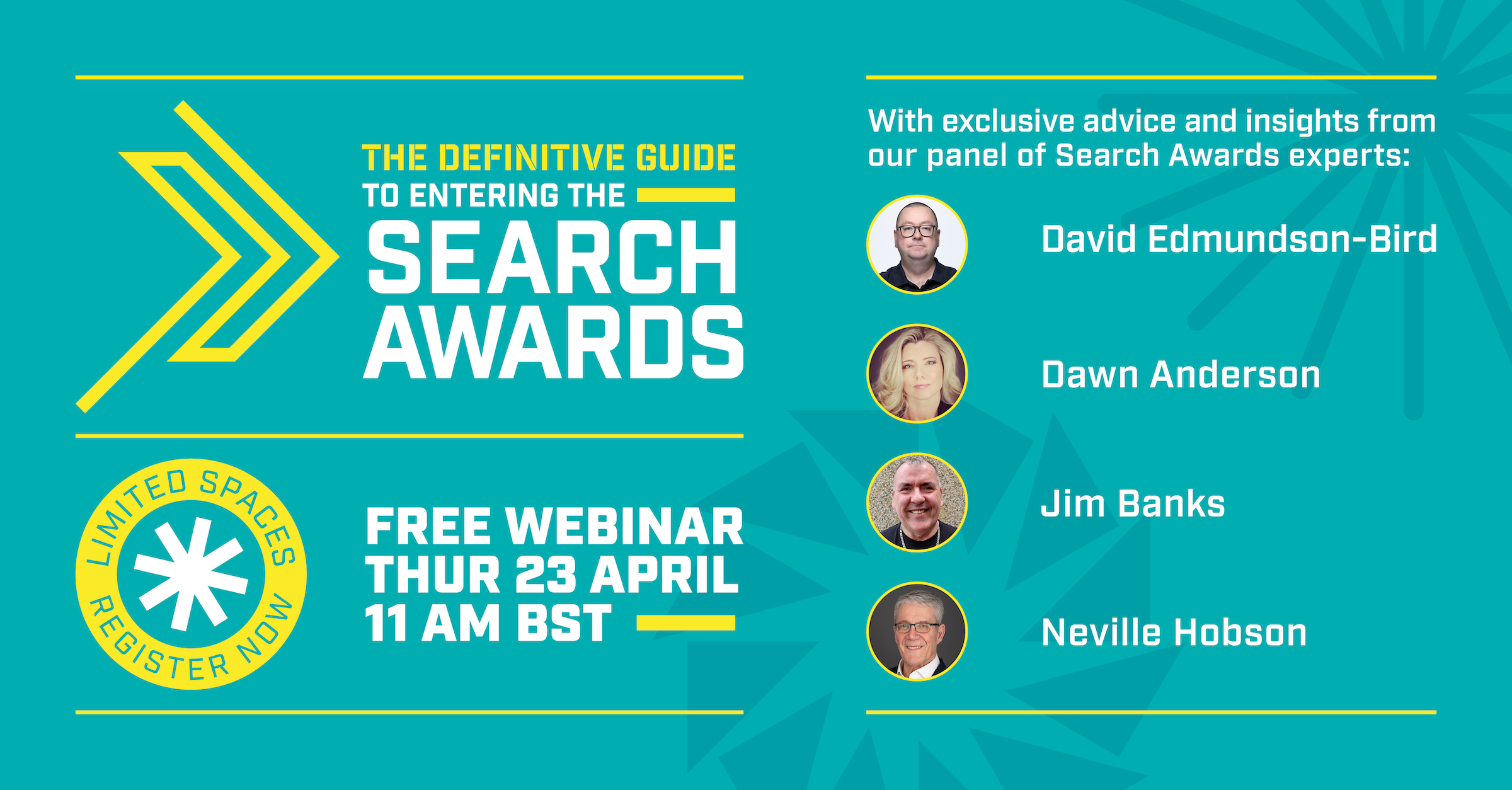Writing winning award entries is a skill. We know it, you know it and our judges know it. But every skill can be taught, including how to get your campaigns noticed and awarded by our judges. That’s why we’ve created the ultimate hack document, with the help of three of our most experienced Search Award judges, so you can make sure your successes receive the recognition they deserve.
Our judges, Aoife Mcilraith, Jim Banks, and Sabiha Shakil, have dissected the Search Awards entry form to let you know exactly what they want to see and exactly what they don’t. So, without further ado, here are the 40 judges’ tips that you need to know (and follow) to create the perfect award entry.
Objectives and Budgets:
- Provide details on your business and the direction of the business.
- Include KPIs and the reasoning behind each point. If you want to increase traffic, let the judges know why you want to increase traffic.
- Include the full costs of running a campaign to give the judges a better understanding of the ROI. Confidentiality reasons could see points deducted.
- Let the judges know if you did anything game-changing, don’t assume they’ll come up with that one their own. Tell them what you want them to think and know about your campaign.
- Awards will be marked down if they haven’t followed the criteria provided in each section. Read them carefully and provide all the information asked for.
- Entries should be 1,000 words maximum, but some sections need more detail than others. Don’t be afraid to, for example, use 150 words in one section and 50 in another. The judges will expect to see more copy in the strategy and implementation section and less in the challenges.
- The judges are always looking for smart objectives. They want to know what specific thing you have tried to achieve, why you wanted to achieve it, how you set out to achieve it, and how you achieved it.
Breakdown of Costs:
- Provide budget specifics, including how large or small your agency or business is. Judges need to know how many people have worked on a project to be able to decide if budgets measure properly with the campaign, so break down the staff staffing totals!
- The judges recommend showing targets as quantifiable metrics, for example, we increased conversions from 150 to 300 a month, rather than increase conversions by 10%. Using percentages makes it difficult for the judges to properly understand budgets.
- Include a breakdown of all costs, including implementation costs, staffing costs, and agency fees. The judges are 100% confidential and this information will not be shared.
- If you’re unable to provide a detailed budget breakdown, include the financial band your budget is within, along with the percentage of the budget allocated for staffing costs, agency fees, and media spending.
- Judges expect to see a breakdown of media costs in incremental detail, including paid media spend across the various channels and the cost of making the video or content.
- Use your supporting documents to demonstrate your breakdown of costs. The judges want to see the total value, so graphs and tables that will help them understand are a must.
Target Audience and Strategy:
- Provide a well-thought-out customer profile or a well-defined buyer profile to help us understand who your target audience is. Do not be vague, show us the details. You can use your supplementary documents here to support your target audience research.
- Define your strategy and your tactics, and remember, strategy is what you want to do, and tactics are how you do it.
- Show the judges how you conceptualize your campaigns: the research, the reasons, and the implementation. Show them why you think your campaign would make a difference and how you used your creativity to make it a success.
- Tell the story of your creative concept. This could be an explanation or visual in the supporting documents.
- Make your target audience as specific and as authentic as possible. Entries that read: my target audience was everyone in the UK will score poorly. Show the judges your brand-new target customers and your existing target customers. Why have they changed? Why haven’t they changed?
- Make sure your target audience matches your media spend. They judges will know that a £100 media spend will not target every person in the UK. Be honest and be through.
Challenges Faced:
- Don’t tell the judges about standard marketing challenges. Tell them about the challenges that are unique to your business and campaign and the solutions you implemented to ensure you were able to overcome your challenges.
- Be open about bottlenecks in your campaigns and processes.
- Tell the judges how you overcame your challenges and if this altered the course of your campaign.
Why Should You Campaign Win:
- Tell the judges why you think your entry deserves to win. Don’t assume they’ll pick up on you implying why you should win.
- Show the judges the impact that your campaign has had on your client, customers, and audience. You can share testimonials to strengthen you points.
Supporting Documents:
- Provide proof to back up EVERY claim you make. Provide screenshots, documents, and images so the judges know they can trust your claims.
- Show the judges evidence of your research, including trend graphs, to strength the case of why your campaign was necessary.
- Make sure your supporting documents clearly link back to your written awards entry. Judges don’t have time to find supporting information without it being clearly and easily signposted.
- The judges are interested in the data and the evidence, not how pretty your supporting documents are.
- Include a detailed supporting information pack with plenty of screenshots, especially if it’s a creative campaign. Show the judges the stages of your creatives – how they looked at the start versus how they looked at the end.
- Include screenshots of Facebook, Instagram, Google ads, and how many people saw the ad, the conversion rates, and accurate dates. It all helps to boost your entry.
- Do not include marketing collateral in your supporting documents. The supporting documents should relate directly to what you have spoken about in your written entry and are not an opportunity to get around the word count.
- Personalise your entries. The judges like to put faces to names, so feel free to details about your campaign leaders, creative leaders, and managers. Especially if you have spoken about diversity and inclusion. Show the judges who you are!
- Do not include long videos and expect the judges to have the time to watch them. The panel doesn’t have the time to watch a 42-minute video but will be able to watch short videos.
Innovation/Software/Product:
- Show the judges the need that your product is addressing. This can be through your research or a detailed target audience and their pain points. The judges need to understand why your product matters.
- Don’t just include your price list. Tell them how many people work in your sales department and how much it costs to develop your tool. Include new feature details and how much your prices have increased and why.
Agency/Team/Rising Star:
- The judges will not award a rising star for simply doing their job. They want to know about side projects, community projects, and volunteering and how these have impacted the people around them for the better.
The Judges’ Top Ten Tips:
- Read the instructions. The magic formula to winning is reading and understanding the instructions.
- The judges have signed NDAs and the award process is completely confidential. Don’t risk losing points by hiding crucial campaign information.
- Be respectful of the judges’ time and follow the word count.
- Don’t just tell them how good you are, prove how good you are.
- Read the entry instructions, make a checklist of all the things that need to be included in each category and check them off before you send it.
- Write your entry, pass it around to the team, take notes, and rewrite it.
- Don’t give the judges fluff. They’re marketing experts who don’t need everything explained to them. Don’t waste your word count on explanations.
- Don’t be afraid to use bullet points in some sections. This can be easier for you and the judges.
- Treat every section as important as the other. They’re all worth 10 points.
- Be honest!






